|
|
|
Sort Order |
|
|
|
Items / Page
|
|
|
|
|
|
|
| Srl | Item |
| 1 |
ID:
088120
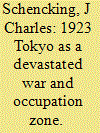

|
|
|
|
|
| Publication |
2009.
|
| Summary/Abstract |
This article documents how Japan's governing elites confronted the enormous tasks of restoring order over the disaster area of the Great Kant? Earthquake and providing relief and recovery assistance to approximately two million people. It also explores how and why numerous commentators evoked the imagery of war in constructing the 1923 catastrophe. They employed comparisons to war not only to describe the totality of destruction meted out by the earthquake and fires, but also to communicate the commitment that they believed the people of Japan would have to make to expedite recovery, rebuild the capital, and reconstruct the nation. Such an effort, many concluded, would require the mobilized efforts of all Japanese.
|
|
|
|
|
|
|
|
|
|
|
|
|
|
|
|
| 2 |
ID:
143117
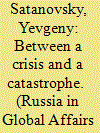

|
|
|
|
|
| Summary/Abstract |
The good thing about our world today is that the spread of information leaves little secret about history. To illustrate this I would like to remind our readers about the Anglo-Russian Convention signed in St. Petersburg in 1907, which left Tibet with China, put Afghanistan under British rule, and divided Iran between Britain and Russia, giving the latter control over the Caspian Sea. If the October Revolution of 1917 had not taken place, the Great Game would have been over. The Sublime Porte shrank enormously after World War I, Russia acquired new territories in Eastern Anatolia under the Sykes-Picot Agreement (a special provision gave Russia control over the Black Sea Straits), and the U.S. presence in the Middle East was barely noticeable, while Britain and France played a leading role in the region.
|
|
|
|
|
|
|
|
|
|
|
|
|
|
|
|
| 3 |
ID:
177775
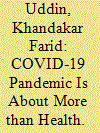

|
|
|
|
|
| Summary/Abstract |
Governance can help minimise the effects of catastrophes. Countries had some time to prepare for the current coronavirus disease 2019 (COVID-19) pandemic, but some did not use it to improve their arrangements. This research investigates several countries’ governance strategies, develops a governance model and critically analyses Bangladesh’s failure as a case of governance catastrophe. This study applies qualitative methods of textual data analysis to explore data sourced from current newspapers, blogs, websites, journal articles and books to determine the most appropriate evidence and generate connections and interpretations. The COVID-19 pandemic has had devastating consequences for all countries; however, the different national responses have provided the opportunity to measure governments’ capability in addressing the crisis. Governments need to study the current COVID-19 response and enhance their governance capacities to minimise the spread of infection and to prepare for the challenge of socio-economic recovery.
|
|
|
|
|
|
|
|
|
|
|
|
|
|
|
|
| 4 |
ID:
184735
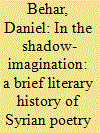

|
|
|
|
|
| Summary/Abstract |
This article argues that when poetic practice in Syria turned to a register of modernity, many of its idioms darkened to a poetics of trauma and catastrophe. By highlighting a Syrian manifesto for the poetics of catastrophe and taking two poets who stylistically stand at polar opposites, I aim to show the diversity of forms in which Syrian witness poetry came into being and set it in a larger framework of efforts to anthologise and globalise twentieth century poetry from sites of violent political conflict. In doing so, I also trace the literary historical trajectories that informed its making in Syria and continued to steer its course well after 2011. Aside from original poetry, the ecosystem of the culture of catastrophe includes critical discourse, novels, cinema, media products, and literary translation. I will address some, not all, of the elements in this repertoire as they relate to poetic production.
|
|
|
|
|
|
|
|
|
|
|
|
|
|
|
|
| 5 |
ID:
096314
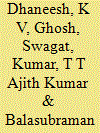

|
|
|
| 6 |
ID:
190821
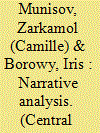

|
|
|
|
|
| Summary/Abstract |
This study examines contemporary poems on the Aral Sea crisis. Labelling them Russophone, the authors argue that the Russian language holds its status of lingua franca for the poets concerned about the environmental disaster in Central Asia. In these poems, the Aral Sea has become a central metaphor for the catastrophe that transcends the original case. The depiction of the diverse environmental issues caused by expanded irrigation policies in Soviet Central Asia provides favourable conditions to study these verses primarily from an ecopoetic perspective. Though these poems address one problem, the narrative form remains diverse: some authors apply various images; others personify the Aral Sea. In these verses the desert image acquires an unorthodox interpretation, while the personification of the Aral Sea in the poems reinforces the prior ecopoetry studies. This article investigates the poems’ content, historical background and anthropogenic effects on nature that pushed their authors to write them.
|
|
|
|
|
|
|
|
|
|
|
|
|
|
|
|
| 7 |
ID:
114594
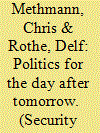

|
|
|
|
|
| Publication |
2012.
|
| Summary/Abstract |
The recent global climate change discourse is a prominent example of a securitization of environmental issues. While the problem is often framed in the language of existentialism, crisis or even apocalypse, climate discourses rarely result in exceptional or extraordinary measures, but rather put forth a governmental scheme of piecemeal and technocratic solutions often associated with risk management. This article argues that this seeming paradox is no accident but follows from a politics of apocalypse that combines two logics - those of security and risk - which in critical security studies are often treated as two different animals. Drawing on the hegemony theory of Ernesto Laclau and Chantal Mouffe, however, this article shows that the two are inherently connected. In the same way as the Christian pastorate could not do without apocalyptic imageries, today's micro-politics of risk depends on a series of macro-securitizations that enable and legitimize the governmental machinery. This claim is backed up by an inquiry into current global discourses of global climate change regarding mitigation, adaptation and security implications. Although these discourses are often framed through the use of apocalyptic images, they rarely result in exceptional or extraordinary measures, but rather advance a governmental scheme of risk management. Tracing the relationship between security and risk in these discourses, we use the case of climate change to highlight the relevance of our theoretical argument.
|
|
|
|
|
|
|
|
|
|
|
|
|
|
|
|
| 8 |
ID:
118215
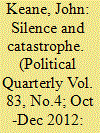

|
|
|
|
|
| Publication |
2012.
|
| Summary/Abstract |
Megaprojects are systems of highly concentrated power whose footprints, or radius of effects, are without precedent in human history. Once upon a time, even under imperial conditions, most people on our planet lived and loved, worked and played within geographically limited communities. They never had to reckon with all of humanity as a factor in their daily lives. Whenever they acted recklessly within their environment, for instance, they had the option of moving on, safe in the knowledge that there was plenty of Earth and not many others. Whenever bad things happened, they happened within limits. Their effects were local. The politics of megaprojects radically alters this equation; it poses new questions about the governance of risk and the nature and limits of democratic politics. The politics of megaprojects-put simply-raises fundamental questions about the 'life and death of democracy'.
|
|
|
|
|
|
|
|
|
|
|
|
|
|
|
|
| 9 |
ID:
094193
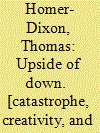

|
|
|
|
|
| Publication |
Washington, Island Press, 2006.
|
| Description |
ix, 429p.
|
| Standard Number |
9781597260640
|
|
|
|
|
|
|
|
|
|
|
|
Copies: C:1/I:0,R:0,Q:0
Circulation
| Accession# | Call# | Current Location | Status | Policy | Location |
| 054815 | 338.927/HOM 054815 | Main | On Shelf | General | |
|
|
|
|
|
|
|
|
|